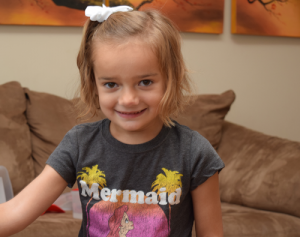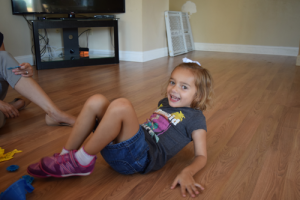- Fax- 740-322-6990
- 740-349-6588
- 800-325-2848
Meet Natalie!
‘(LCBDD) guided us every step of the way”
September 12, 2016
‘The board has always been right there’
September 14, 2016With support from LCBDD, Natalie Crider is gaining the skills she needs to learn and grow.
When they were told their daughter Natalie had Grin2B, Mike and Brittaney Crider could have easily felt isolated.
But even though their 4-year-old is likely one of several dozen people in the world with the rare genetic disorder, the Criders knew they weren’t alone.
The Bowling Green Township family has been receiving support from the Licking County Board of Developmental Disabilities (LCBDD) for several years. Staff members have bee n working closely with Mike and Brittaney to help Natalie meet her goals.
n working closely with Mike and Brittaney to help Natalie meet her goals.
“Beyond the financial support, we’ve really appreciated the emotional support,” Brittaney said.
Shortly after Natalie was born, her parents realized she was having trouble eating. As she grew, she wasn’t hitting the milestones of other children her age.
She began several types of therapy in Columbus but it was clear that she was uncomfortable in unfamiliar environments, Mike said.
As she was approaching her second birthday, Natalie was still drinking from a bottle. She had significant difficulties eating and wasn’t walking.
Their family got connected with LCBDD’s Early Intervention program and were surprised to find out staff members would come to their home to work with Natalie
“In the past, when I thought of (the board), I didn’t know that service was available,” Mike said. “Getting her to accept a new setting was a long process so it was amazing that they could meet with us at the house.”
Mike and Brittaney knew one of their goals was to one day go to a restaurant as a family and have Natalie be able to eat something off the menu.
LCBDD staff members would sit down with them during dinner — working to strengthen the muscles in Natalie’s mouth and her tongue while introducing new foods.
“Without Early Intervention, we wouldn’t have gotten her off the bottle. It was so stressful. She wasn’t gaining weight and she was falling off the charts,” Brittaney said. “The other day, she ate a cheeseburger in the backseat of the car. It’s amazing. It’s those little milestones that are such a big deal.”
Natalie was also struggling with walking.
Using Family Support Services funds provided by LCBDD, the Criders were able to purchase two sets of supramalleor orthotics — braces that supported her ankles.
Family Support Services funds are available to board-eligible children, adults and families to help them acquire goods, services and supports that address the special needs of their family member with a disability.
Within a few weeks of receiving the orthotics, Natalie became much more mobile, learning to walk when she was 22 months old.
“Paying for those would have been something that would have been hard for us to take care of,” Brittaney said.
Natalie continues to be supported by LCBDD and also receives services through her preschool.
Because she had a significant speech delay, Natalie is learning to use an iPad and a LAMP Words for Life app to communicate.
The board was able to connect the Criders with the Licking County Foundation’s Thomas M. Kier Memorial Fund, which helped them purchase the device and app.
Established in the 1970s, the fund was established to support the unmet needs of children with disabilities in Licking County.
The Foundation recently established a partnership with LCBDD, providing the agency with an annual distribution from the Kier Fund to provid e financial assistance to the families of the children it supports.
e financial assistance to the families of the children it supports.
Using the device, Natalie has been able to communicate what she wants — including what she wants for breakfast — with just the push of a button.
“She takes (the iPad) to school with her,” Brittaney said. “I just got a note from her teacher that she was naming objects around her classroom really well.”
Because her condition is so rare, it’s hard to predict what Natalie’s future needs might be. But Brittaney and Mike said they are confident that LCBDD will help them navigate whatever comes next.
“It’s amazing to know the board will support our daughter as long as she needs it,” Brittaney said. “Most people don’t realize the type of impact the board can have. They don’t realize how many lives it touches.”
Save
Save
Save
Save
Save
Save




